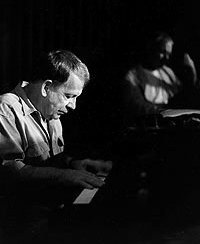
Photo: Skip Bolen
Pete Jolly started out in music following in the footsteps of his father
and with the same name, Peter Ceragioli. He
was born in
Meanwhile, at age six, he had begun taking piano lessons and played in
local bands while attending junior high school. As a teenager, he moved
with his family to
His first job here was with Barney Kessel and in the course of the next several decades his jazz work found him playing in rhythm sections accompanying artists such as Bill Berry, Buddy Collette, Buddy De Franco, Jon Eardley, Terry Gibbs, Benny Goodman, J. J. Johnson, Gerry Mulligan, Lennie Niehaus, Red Norvo, Anita O'Day, Marty Paich, Art Pepper and Mel Tormé. In particular, he played often with Shelly Manne and Shorty Rogers. His first own name album came in 1955, Jolly Jumps In, and around this same time he began playing on film soundtracks, eventually registering some 200 appearances, occasionally on screen, that include The Wild Party (1956), I Want To Live (1959), Willie Dynamite (1973), The Conversation (1974) and Heart Beat (1979). His television recording dates include episodes of Dallas, Get Smart, I Spy, The Love Boat, Mannix and M*A*S*H.
Although the piano had become his first instrument, he continued to play the accordion, bringing to the instrument an enviable lightness of touch and interesting single-note bop styling, and he also sometimes played organ. Starting in 1964, for more than thirty years he led his own trio, the personnel of which was remarkably consistent, the other musicians usually being Chuck Berghofer, bass, and Nick Martinis, drums. One of his compositions, Little Bird, was Grammy-nominated in 1963. From the mid-1980s, in common with many other musicians, Jolly was hired less and less for studio work - synthesizers had begun to take over - and he proportionately increased his jazz club work.
He continued to make records, including 1980's Strike Up the Band, 1995's Yeah, and in 2001 came Collaboration, a
set with fellow pianist Jan Lundgren, which proved to be his last formal
recording date. Diagnosed with bone marrow cancer, he continued to perform
with his trio until August 2004 before being confined to the
Throughout his career, Pete Jolly enjoyed the respect of his peers and of discerning audiences. He will be much missed by those who heard him and knew him as someone who not only lived up to his reputation as a fine musician but was also an open and friendly man who reflected the name he bore throughout most of his life. Bruce Crowther
Copyright © 2004 Bruce Crowther.. Used by permission